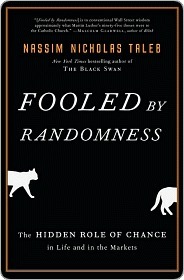More on this book
Community
Kindle Notes & Highlights
Read between
May 18, 2024 - May 10, 2025
Normative economics is like religion without the aesthetics.
What do you look at: your monthly, your daily, your life-to-date, or your hourly performance? You can have a good month and a bad day. Which period should dominate?
This anchoring to a number is the reason people do not react to their total accumulated wealth, but to differences of wealth from whatever number they are currently anchored to.
System 1 is effortless, automatic, associative, rapid, parallel process, opaque (i.e., we are not aware of using it), emotional, concrete, specific, social, and personalized. System 2 is effortful, controlled, deductive, slow, serial, self-aware, neutral, abstract, sets, asocial, and depersonalized.
I am glad to be a trader taking advantage of people’s biases but I am scared of living in such a society.
By a law of probability called distribution of the maximum of random variables, the maximum of an average is necessarily less volatile than the average maximum.
the interpretation is not linear; a 2% move is not twice as significant an event as 1%, it is rather like four to ten times. A 7% move can be several billion times more relevant than a 1% move! The headline of the Dow moving by 1.3 points on my screen today has less than one billionth of the significance of the serious 7% drop of October 1997.
Wittgenstein’s ruler: Unless you have confidence in the ruler’s reliability, if you use a ruler to measure a table you may also be using the table to measure the ruler. The less you trust the ruler‘s reliability (in probability called the prior),the more information you are getting about the ruler and the less about the table. The point extends way beyond information and probability. This conditionality of information is central in epistemology, probability, even in studies of consciousness.
gambling to me is best defined as an activity where the agent gets a thrill when confronting a random outcome, regardless of whether he has the odds stacked in his favor or against him.
we are not made to view things as independent from each other. When viewing two events A and B, it is hard not to assume that A causes B, B causes A, or both cause each other. Our bias is immediately to establish a causal link.
One of the most irritating conversations I’ve had is with people who lecture me on how I should behave. Most of us know pretty much how we should behave. It is the execution that is the problem, not the absence of knowledge.
probability is not about the odds, but about the belief in the existence of an alternative outcome, cause, or motive.
Monsieur de Norpois is made to be ashamed of the fact that he expressed a different opinion. Proust did not consider that the diplomat might have changed his mind. We are supposed to be faithful to our opinions. One becomes a traitor otherwise.
There are reasons to believe that, for evolutionary purposes, we may be programmed to build a loyalty to ideas in which we have invested time.
My lesson from Soros is to start every meeting at my boutique by convincing everyone that we are a bunch of idiots who know nothing and are mistake-prone, but happen to be endowed with the rare privilege of knowing it.
The scientist’s behavior while facing the refutation of his ideas has been studied in depth as part of the so-called attribution bias. You attribute your successes to skills, but your failures to randomness.
The attribution bias has another effect: It gives people the illusion of being better at what they do, which explains the findings that 80 to 90% of people think that they are above the average (and the median) in many things.
Self-help books (even when they are not written by charlatans) are largely ineffectual. Good, enlightened (and “friendly”) advice and eloquent sermons do not register for more than a few moments when they go against our wiring. The interesting thing about stoicism is that it plays on dignity and personal aesthetics, which are part of our genes. Start stressing personal elegance at your next misfortune. Exhibit sapere vivere (“know how to live”) in all circumstances.


